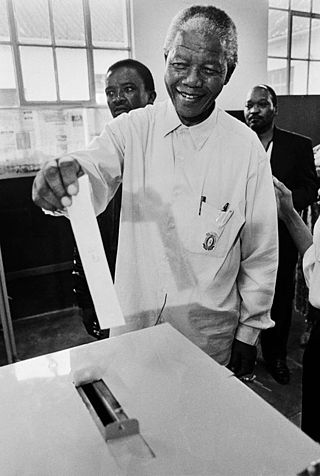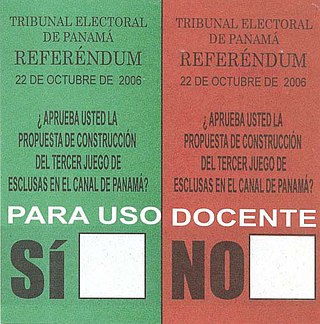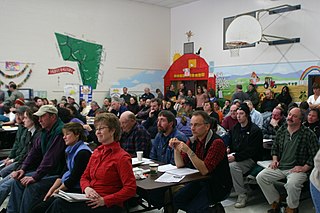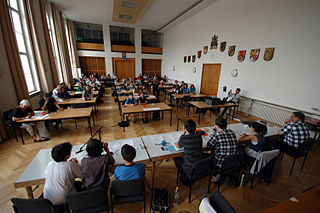An electocracy is a political system where citizens are able to elect their government but cannot participate directly in governmental decision making as the government does not share its power. Electocracy is seen as a premature form of democracy due to the shared similarities of citizens casting ballots, however electocracy is not considered a democracy, though many democracies have electocracy involvement. [1] In contrast to democracy, where citizens are able to participate in the making of decisions that affect them, electocracy sees decision-making limited to an elected individual or group who may then govern in an arbitrary and unaccountable manner until the next election.
The United States government for example, elects a president to govern the nation. This "winner-takes-all" election is an example of electocracy within a democracy as the president of the United States has the final say in governmental decisions on a national level. [1] Where democracy separates itself in the United States government from electocracy is on the local level. Citizens of the United States have more power over their local governments via mayors, governors and so forth which are also elected. These elections are balloted over a smaller amount of the population, allowing for more "by the people, for the people" representation in the government. At this level of government, citizens are able to intervene on public issues and participate in the decision making that will affect them, hence forth making the differentiation between an electocratic form of government and a democratic form of government.
Iraq has been cited as an example of an electocracy, [2] as has Thailand before the coup of 2006. [3] Chinese political scientist Wang Shaoguang views Western democracy itself as electocracy. [4] Many post-communistic countries have adopted versions of electocracy as their form of government, each varying in the amount of elections held annually. [5] Some former British colonies such as Malaysia have been introduced to electocracy as a political system alternative to communism which became a threat to Malaysian government post World War II. [6]

Democracy is a system of government in which state power is vested in the people or the general population of a state. Under a minimalist definition of democracy, rulers are elected through competitive elections while more expansive definitions link democracy to guarantees of civil liberties and human rights in addition to competitive elections.

An election is a formal group decision-making process by which a population chooses an individual or multiple individuals to hold public office.
A republic, based on the Latin phrase res publica, is a state in which political power rests with the public through their representatives—in contrast to a monarchy.

In the United States, politics functions within a framework of a constitutional federal republic and presidential system, with three distinct branches that share powers: the U.S. Congress which forms the legislative branch, a bicameral legislative body comprising the House of Representatives and the Senate; the executive branch, which is headed by the president of the United States, who serves as the country's head of state and government; and the judicial branch, composed of the Supreme Court and lower federal courts, and which exercises judicial power.

Direct democracy or pure democracy is a form of democracy in which the electorate decides on policy initiatives without elected representatives as proxies. This differs from the majority of currently established democracies, which are representative democracies. The theory and practice of direct democracy and participation as its common characteristic was the core of work of many theorists, philosophers, politicians, and social critics, among whom the most important are Jean Jacques Rousseau, John Stuart Mill, and G.D.H. Cole.

Voting is a method by which a group, such as a meeting or an electorate, convenes together for the purpose of making a collective decision or expressing an opinion usually following discussions, debates or election campaigns. Democracies elect holders of high office by voting. Residents of a jurisdiction represented by an elected official are called "constituents", and the constituents who choose to cast a ballot for their chosen candidate are called "voters." There are different systems for collecting votes, but while many of the systems used in decision-making can also be used as electoral systems, any which cater to proportional representation can only be used in elections.
Participatory democracy, participant democracy, participative democracy, or semi-direct democracy is a form of government in which citizens participate individually and directly in political decisions and policies that affect their lives, rather than through elected representatives. Elements of direct and representative democracy are combined in this model.

Town meeting, also known as an "open town meeting," is a form of local government in which eligible town residents can directly participate in an assembly which determines the governance of their town. Unlike representative town meeting where only elected representatives can participate in the governing assembly, any town voter may participate in an open town meeting. This form is distinct from town hall meetings held by elected officials to communicate with their constituents, which have no decision-making power.
Nonpartisan democracy is a system of representative government or organization such that universal and periodic elections take place without reference to political parties. Sometimes electioneering and even speaking about candidates may be discouraged, so as not to prejudice others' decisions or create a contentious atmosphere.

E-democracy, also known as digital democracy or Internet democracy, uses information and communication technology (ICT) in political and governance processes. The term is credited to digital activist Steven Clift. By using 21st-century ICT, e-democracy seeks to enhance democracy, including aspects like civic technology and E-government. Proponents argue that by promoting transparency in decision-making processes, e-democracy can empower all citizens to observe and understand the proceedings. Also, if they possess overlooked data, perspectives, or opinions, they can contribute meaningfully. This contribution extends beyond mere informal disconnected debate; it facilitates citizen engagement in the proposal, development, and actual creation of a country's laws. In this way, e-democracy has the potential to incorporate crowdsourced analysis more directly into the policy-making process.
In political science, the term polyarchy was used by Robert A. Dahl to describe a form of government in which power is invested in multiple people. It takes the form of neither a dictatorship nor a democracy. This form of government was first implemented in the United States and France and gradually adopted by other countries. Polyarchy is different from democracy, according to Dahl, because the fundamental democratic principle is "the continuing responsiveness of the government to the preferences of its citizens, considered as political equals" with unimpaired opportunities. A polyarchy is a form of government that has certain procedures that are necessary conditions for following the democratic principle.
Politeia is an ancient Greek word used in Greek political thought, especially that of Plato and Aristotle. Derived from the word polis ("city-state"), it has a range of meanings from "the rights of citizens" to a "form of government".

Participatory budgeting (PB) is a type of citizen sourcing in which ordinary people decide how to allocate part of a municipal or public budget through a process of democratic deliberation and decision-making. Participatory budgeting allows citizens or residents of a locality to identify, discuss, and prioritize public spending projects, and gives them the power to make real decisions about how money is spent.

Elections in Cuba are held at municipal, provincial, and national levels. Cuba is a one-party state, with the Communist Party of Cuba being described as the "superior driving force of the society and the state" in the Constitution of Cuba, and the communist party is the only official political party. Elections in Cuba are not considered democratic because the government does not allow free and fair voting.
A municipal council is the legislative body of a municipality or local government area. Depending on the location and classification of the municipality it may be known as a city council, town council, town board, community council, rural council, village council, or board of aldermen.

Liberal democracy, western-style democracy, or substantive democracy is a form of government that combines the organization of a representative democracy with ideas of liberal political philosophy.
Types of democracy refers to the various governance structures that embody the principles of democracy in some way. Democracy is frequently applied to governments, but may also be applied to other constructs like workplaces, families, community associations, and so forth.

Youth councils or parliaments, are a form of youth voice engaged in community decision-making. Youth councils are appointed bodies that exist on local, state, provincial, regional, national, and international levels among governments, non governmental organisations (NGOs), schools, and other entities. Groups that include children often call themselves children's parliaments and are paired with youth parliaments of older kids.
Direct democracy refers to decision making or direct vote a proposal, law, or political issue by the electorate, rather than being voted on by representatives in a state or local legislature or council.
The following outline is provided as an overview of and topical guide to democracy.










